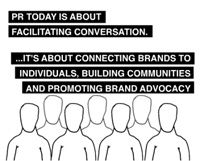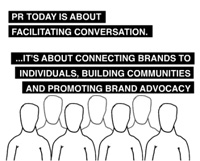Political PR and the age of the web

 How should PR professionals use the web? That’s one of the issues I read up on in order to better advise political clients with regard to the websites I produce as a freelancer. My main starting point in the UK has been Daljit Bhurji’s blog (many moons ago Daljit and I used to write for the same student newspaper). His refrain is that PR firms have failed to grasp the benefits of using the web to create communications opportunities, and he’s started his own agency (Diffusion PR) to try to offer specialised services in London. He cites an article by Paul Holmes as one of the sources of inspiration for the new agency, and one line of that particularly caught my attention:
How should PR professionals use the web? That’s one of the issues I read up on in order to better advise political clients with regard to the websites I produce as a freelancer. My main starting point in the UK has been Daljit Bhurji’s blog (many moons ago Daljit and I used to write for the same student newspaper). His refrain is that PR firms have failed to grasp the benefits of using the web to create communications opportunities, and he’s started his own agency (Diffusion PR) to try to offer specialised services in London. He cites an article by Paul Holmes as one of the sources of inspiration for the new agency, and one line of that particularly caught my attention:
Meanwhile, the annual Trust Barometer surveys conduced by international public relations firm Edelman continue to show that in major markets around the world, people increasingly find “a person like you” to be the most credible source of information: more credible by far than paid advertising and even earned media coverage.
Apply that to politics and what do you get? Most politics has always been based on that ‘person like you’ principle. Candidates for positions go around knocking on doors and attending rallies at election time. Meet the person, see the face, shake the hand, build the rapport. The problem is that doesn’t work as well as it used to – does anyone believe the politicians as much as they used to?
Throwing money at the problem is no good. However much Labour invests in a website like Better With Labour no-one is going to believe it. A site like NHS Blog Doctor or Random Acts of Reality is much more credible (and, I suspect, has many more visitors). Even if you put a comment function on your site – like the Jim Murphy’s blog – you can suffer the same fate (just with the opportunity for ranters to sound off).
Extrapolate all of that to EU politics and the potential for using the internet for political ends is even greater. MEPs can’t possibly meet their entire electorate. But really using the internet to inspire and communicate, and generate conversations about politics? It’s possible. With a shoestring budget we’ve managed to show what can be done with whodoicall.eu – 2 bloggers, 200 Euro and a bunch of folks on Facebook and we end up in IHT. The guys at Fleishman-Hillard in Brussels are making a good effort at introducing clients to Web 2.0 but I suspect no MEPs could afford them. Puffbox is doing interesting work in the London political arena. But in Brussels?
Perhaps a niche you may wish to explore 🙂
Which leads me to wonder which firms – if any – are providing decent Web 2.0 services for candidates, parties, MEPs etc.
Jon,
Many thanks for the reference to our own humble efforts to introduce our clients to web 2.0. A couple of comments about what we are doing in our Fleishman-Hillard Brussels office.
Despite most of us having political experience, affiliation and interests of some sort, FH does not work for candidates, MEPs or political parties here in Brussels. We are non-partisan but politically interested and thankfully so.
In terms of what we are seeking to do with our clients, we agree wholeheartedly with you that online communications is underused in Brussels based (EU focused) advocacy and communications. We are, like you, missionary in our zeal to spread the digital word (hence our own blog and other activities) with our own corporate client base. However, at heart we want to be able to offer our clients a full range of services, from government relations and media relations through to online grassroots and blogger outreach.
In each case, we seek to select the most effective communications tools to help our clients reach their goals. Sometimes this will include online activities, sometimes it will not. The advantage our clients get from coming to a full service agency like ours is that we can help them select the right tactics to get to their desired goal, whether in Brussels or elsewhere in the world.
James
Jon,
While it is possible for a politician to hire someone like you who design glorious web pages or a blog, is the real problem that they realise that it takes a tremendous amount of time and effort to produce and present meaningful content continuously, especially if they are going to discuss with their commentators?
But, in the end, I suppose that an active web or blog presence is becoming ever more important for almost every politician and at every level.
Each of them should at least look at the blogs of Carl Bildt and Alexander Stubb, and then take the plunge. Is it only a coincidence that these two guys are foreign ministers today?
Perhaps that is the question you should put to your potential clients.
Interesting!
I’m not so sure it’s that hard for a politician to do it effectively. How much time did Stubb actually spend on his blog? All a politician need do is have one of their assistants that’s internet savvy, and be ready to spend perhaps 3000 Euro a year in total. Most politicians should be capable of that…
As for my clients – trying to get them to have a website at all is asking a lot. Plus they assume I’m just a designer, not a strategist. If you know any politicians open minded about the web then send them my way! 🙂
I’m sure it can be done, and there are some politicians that are good at it… But the really good examples of British politicians using the web are few and far between.
Does anyone believe that politicians exist on this mortal Earth any more, or are they so removed from reality that there is no chance of building any sort of relationship with them?